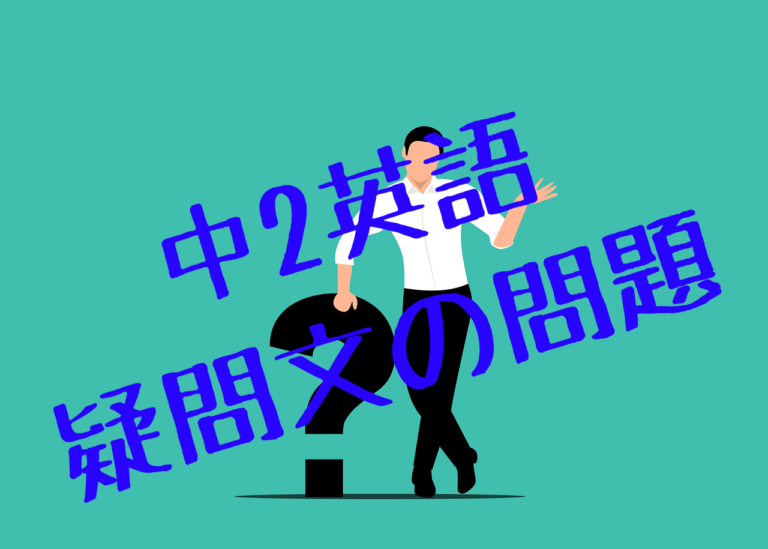中2英語の疑問文を作る問題をたくさん解きたい
疑問文の作り方がマスターできるようにわかりやすく解説してほしい
英語のテストによく出る疑問文の問題を教えてほしい!
今回の記事はこういった要望に応えます。
中学2年からは、未来形、助動詞、不定詞などややこしい文法をどんどん習います。
「疑問文の作り方とか、もうわけがわかんないよ〜」と迷子になる人がたくさん出てきますが、安心してください。
実は、英語の疑問文の作り方は、実はとってもシンプル なんです。
この記事を読めば、
- 中2英語の疑問文の作り方・コツがわかる
- 中2英語の疑問文のパターンが身に付く
- 中2英語の疑問文の問題がスラスラ解ける
ようになります!
- 1 中学英語:疑問文の作り方【鉄則】
- 2 疑問文の英訳は 4ステップ!
- 3 中2英語:疑問文の英訳問題【25題】
- 3.1 (1) あなたは昨日忙しかったですか?
- 3.2 (2) 彼は3年前アメリカにいましたか。
- 3.3 (3) 彼女はそのとき木の下に立っていましたか。
- 3.4 (4) ケンとクミは昼食を食べていましたか。
- 3.5 (5) あなたは先月名古屋に住んでいましたか。
- 3.6 (6) 来週の日曜日はくもりですか。
- 3.7 (7) あなたは来週の日曜日に映画を見るつもりですか。(be going toを使って)
- 3.8 (8) 机の上に1冊のノートがありますか。
- 3.9 (9) 公園にたくさんの子供たちがいましたか。
- 3.10 (10) 私は今家に帰らなければいけませんか。
- 3.11 (11) 彼は明日の朝、早起きしなければいけませんか。 (have toを使って)
- 3.12 (12) 私と一緒に外出してくれませんか。
- 3.13 (13) 窓を開けましょうか。
- 3.14 (14) テニスをするために公園に行きませんか。
- 3.15 (15) あなたはコーヒーを一杯飲みたいですか。 (would like toを使って)
- 3.16 (16) 彼女は今やるべきことがたくさんありますか。
- 3.17 (17) 彼女は幸せそうですか。
- 3.18 (18) あなたは手紙を書き終えましたか。
- 3.19 (19) あなたのお父さんは、あなたに新しい自転車を買ってくれましたか。
- 3.20 (20) ケンはトムより背が高いですか。
- 3.21 (21) エミはユキより速く泳げますか。
- 3.22 (22) この問題は、あの問題より難しいですか。
- 3.23 (23) あなたは冬よりも夏の方が好きですか。
- 3.24 (24) ボブは私たちのクラスの中で一番背が高いですか。
- 3.25 (25) この本は3冊の中で一番面白かったですか。
中学英語:疑問文の作り方【鉄則】
中学英語の疑問文の作り方・解くためのコツは、以下の記事で詳しく説明しています。
学校では教えてくれないような、解き方の「鉄則」なども紹介してしています。
英語の疑問文の作り方がイマイチ理解できていない 中学のテストで英作文の問題が出たら、うわ〜無理だ〜と思ってしまう 疑問文を作るときのルール・文法をわかりやすく解説してほしい! こういった悩みを持っている人に向けて、この記事を書[…]
疑問文の英訳は 4ステップ!
上の記事で説明したことを踏まえて、実際に「日本語の文を英語に直す(英訳)」問題を解いてみましょう。
疑問文の英訳問題 では、次の4ステップで解くことがポイントです。
- S(主語)、V(動詞)を決める
- 3つの内どのパターンになるか考える(be動詞、一般動詞、助動詞の文)
- 肯定文を作る
- 疑問文に直す
この手順で解けば、スムーズに正解が出せるはずです。
中2英語:疑問文の英訳問題【25題】
それでは、中2英語の疑問文の問題(英訳)を解いてみましょう。
(1) あなたは昨日忙しかったですか?
【解き方】
① S、Vを決める
- S(主語)= あなたは → you
- V(動詞) = 忙しかったです → be動詞(were)
② <be動詞の文>(過去形)
③ 肯定文:You were busy yesterday.
④ 疑問文:Were you busy yesterday?
(2) 彼は3年前アメリカにいましたか。
【解き方】
① S、Vを決める
- S(主語)= 彼は → he
- V(動詞) = いました → be動詞(was)
② <be動詞の文>(過去形)
③ 肯定文:He was in America three years ago.
④ 疑問文:Was he in America three years ago?
□ 〜 ago(〜前に)
(3) 彼女はそのとき木の下に立っていましたか。
【解き方】
① S、Vを決める
- S(主語)= 彼女は → she
- V(動詞) = 立っていました(過去進行形)→ be動詞(was)
② <be動詞の文>
③ 肯定文:She was standing under the tree then?
④ 疑問文:Was she standing under the tree then?
□ then(そのとき)= at that time
(4) ケンとクミは昼食を食べていましたか。
【解き方】
① S、Vを決める
- S(主語)= ケンとクミは → Ken and Kumi
- V(動詞) = 食べていました(過去進行形)→ be動詞(were)+ having
② <be動詞の文>
③ 肯定文:Ken and Kumi were having [eating/taking] lunch?
④ 疑問文:Were Ken and Kumi having [eating/taking] lunch?
(5) あなたは先月名古屋に住んでいましたか。
【解き方】
① S、Vを決める
- S(主語)= あなたは → you
- V(動詞) = 住んでいました → live
② <一般動詞の文>(過去形)
③ 肯定文:You lived in Nagoya last month.
④ 疑問文:Did you live in Nagoya last month?
【注意】
live は「住んでいる」という 状態 を表す動詞なので、進行形にできません。このような動詞を 状態動詞 と言います。
状態動詞 には、live 以外にも
- have(持っている)
- know(知っている)
などがあります。
(6) 来週の日曜日はくもりですか。
【解き方】
① S、Vを決める
- S(主語)= 天候の it
- V(動詞)= be動詞
② <助動詞の文>(未来形:will)
③ 肯定文:It will be cloudy tomorrow.
④ 疑問文:Will it be cloudy tomorrow?
【語句】
□ cloudy(くもり)
(7) あなたは来週の日曜日に映画を見るつもりですか。(be going toを使って)
【解き方】
① S、Vを決める
- S(主語)= あなたは → you
- V(動詞)= 見るつもりです → be going to see
② <be動詞の文>(未来形:be going to)
③ 肯定文:You are going to see the movie next Sunday?
④ 疑問文:Are you going to see the movie next Sunday?
【語句】
□ be going to + 動詞の原形(〜するつもり)
□ next Sunday(来週の日曜日)
(8) 机の上に1冊のノートがありますか。
【解き方】
① S、Vを決める
- S(主語)= 一冊のノートが → a notebook
- V(動詞)= あります → be動詞(is)
② <be動詞の文>(There is 〜 構文)
③ 肯定文:There is a notebook on the desk.
④ 疑問文:Is there a notebook on the desk?
【語句】
□ There is [are] 〜. (〜があります。)
(9) 公園にたくさんの子供たちがいましたか。
【解き方】
① S、Vを決める
- S(主語)= たくさんの子供たちが → many children
- V(動詞)= いました → be動詞(were)
② <be動詞の文>(There is 〜 構文)
③ 肯定文:There were many children in the park.
④ 疑問文:Were there many children in the park?
【語句】
□ many (たくさんの〜)[数] → 数えられる名詞
= a lot of 〜
= lots of 〜
(cf.) much(たくさんの〜)[量] → 数えられない名詞
(10) 私は今家に帰らなければいけませんか。
解答例は2通りあります。どちらでも答えられるようにしましょう。
【解き方1:must】
① S、Vを決める
- S(主語)= 私は → I
- V(動詞) = 帰らなければいけません → go
② <助動詞の文>(must)
③ 肯定文:I must go home now.
④ 疑問文:Must I go home now?
【解き方2:have to】
① S、Vを決める
- S(主語)= 私は → I
- V(動詞) = 帰らなければいけません → have to go
② <一般動詞の文>(have to)
③ 肯定文:I have to go home now?
④ 疑問文:Do I have to go home now?
(11) 彼は明日の朝、早起きしなければいけませんか。 (have toを使って)
今回は「have toを使って」と指示があるので、以下の解答だけOK。
【解き方】
① S、Vを決める
- S(主語)= 彼は → he
- V(動詞) = しなければいけません → have to
② <一般動詞の文>(have to)
③ 肯定文:He has to get up early tomorrow morning.
④ 疑問文:Does he have to get up early tomorrow morning?
【語句】
□ tomorrow morning(明日の朝)
(12) 私と一緒に外出してくれませんか。
【解き方】
① S、Vを決める
- S(主語)= (あなたが) → you
- V(動詞) = 外出する → go out
② <助動詞の文>(can)
③ 肯定文:You can go out with me.
④ 疑問文:Can you go out with me?
【語句】
□ Can you 〜?(〜してくれませんか。)[依頼] ≒ Could you 〜?
□ go out(外出する)
(13) 窓を開けましょうか。
【解き方】
① S、Vを決める
- S(主語)= (私が) → I
- V(動詞) = 開ける → open
② <助動詞の文>(shall)
③ (肯定文:I shall open the window.)→ 飛ばしてもOK
④ 疑問文:Shall I open the window?
【語句】
□ Shall I 〜?(〜しましょうか。)[提案]
(14) テニスをするために公園に行きませんか。
【解き方】
① S、Vを決める
- S(主語)= (私たちが) → we
- V(動詞) = 行く → go
② <助動詞の文>(shall)
③ (肯定文:We shall go to the park to play tennis?)→ 飛ばしてもOK
④ 疑問文:Shall we go to the park to play tennis?
※ to play tennis は「不定詞(to + 動詞の原形)」の 副詞的用法 → 「〜するために」
【語句】
□ Shall we 〜?(〜しませんか。)[勧誘]
≒ Let’s 〜!(〜しましょう!)
≒ Why don’t we 〜?(〜しましょう!)
(15) あなたはコーヒーを一杯飲みたいですか。 (would like toを使って)
【解き方】
① S、Vを決める
- S(主語)= あなたは → you
- V(動詞) = 飲みたいです → would like to drink
② <助動詞の文>(would)
③ 肯定文:You would like to drink a cup of coffee.
④ 疑問文:Would you like to drink a cup of coffee?
もし「would like toを使って」という指示がなければ、以下の解答でもOKです。
Would you like a cup of coffee?(一般的な言い方&丁寧)
Do you want to drink a cup of coffee?
Do you want a cup of coffee?
【語句】
□ would like to 〜(〜したい)≒ want to 〜
□ would like 〜(〜がほしい)≒ want 〜
(16) 彼女は今やるべきことがたくさんありますか。
【解き方】
① S、Vを決める
- S(主語)= 彼女は → she
- V(動詞) = あります → have
② <一般動詞の文>(現在形)
③ 肯定文:She has a lot of thing to do now.
④ 疑問文:Does she have a lot of thing to do now?
※ to do now は「不定詞(to + 動詞の原形)」の 形容詞的用法 → 「〜するための・するべき」
(17) 彼女は幸せそうですか。
【解き方】
① S、Vを決める
- S(主語)= 彼女は → she
- V(動詞) = 〜そうです → look
② <一般動詞の文>
③ 肯定文:She looks happy.
④ 疑問文:Does she look happy?
【語句】
□ look 〜(〜そうに見える)
(18) あなたは手紙を書き終えましたか。
【解き方】
① S、Vを決める
- S(主語)= あなたは → you
- V(動詞) = 終えました → finish
② <一般動詞の文>
③ 肯定文:You finished writing a letter.
④ 疑問文:Did you finish writing a letter?
【語句】
□ finish 〜ing(〜し終える)
(19) あなたのお父さんは、あなたに新しい自転車を買ってくれましたか。
【解き方】
① S、Vを決める
- S(主語)= あなたのお父さんは → your father
- V(動詞) = 買ってくれました → buy
② <一般動詞の文>(過去形)
③ 肯定文:Your father bought you a new bike.
④ 疑問文:Did your father buy you a new bike?
【語句】
□ buy A B(AにBを買う)
(20) ケンはトムより背が高いですか。
【解き方】
① S、Vを決める
- S(主語)= ケンは → Ken
- V(動詞) = です → be動詞(is)
② <be動詞の文>
③ 肯定文:Ken is taller than Tom.
④ 疑問文:Is Ken taller than Tom?
(21) エミはユキより速く泳げますか。
【解き方】
① S、Vを決める
- S(主語)= エミは → Emi
- V(動詞) = 泳ぐ → swim
② <助動詞の文>(can)
③ 肯定文:Emi can swim faster than Yuki.
④ 疑問文:Can Emi swim faster than Yuki?
【語句】
□ swim fast(速く泳ぐ)
(22) この問題は、あの問題より難しいですか。
【解き方】
① S、Vを決める
- S(主語)= この問題は → this question
- V(動詞) = です → be動詞(is)
② <be動詞の文>(現在形)
③ 肯定文:This question is more difficult than that one.
④ 疑問文:Is this question more difficult than that one?
(23) あなたは冬よりも夏の方が好きですか。
【解き方】
① S、Vを決める
- S(主語)= あなたは → you
- V(動詞) = 好き → like
② <一般動詞の文>(現在形)
③ 肯定文:You like summer better than winter.
④ 疑問文:Do you like summer better than winter?
【語句】
□ like A better than B(BよりAの方が好き)
(24) ボブは私たちのクラスの中で一番背が高いですか。
【解き方】
① S、Vを決める
- S(主語)= ボブは → Bob
- V(動詞) = です → be動詞(is)
② <be動詞の文>(現在形)
③ 肯定文:Bob is the tallest in our class.
④ 疑問文:Is Bob the tallest in our class?
【語句】
□ the 最上級 in 単数 / of 複数(〜の中で最も・・・)
(25) この本は3冊の中で一番面白かったですか。
【解き方】
① S、Vを決める
- S(主語)= この本は → this book
- V(動詞) = 面白かったです → be動詞(was)
② <be動詞の文>(過去形)
③ 肯定文:This book was the most interesting of the three.
④ 疑問文:Was this book the most interesting of the three?
質問・要望があれば気軽にコメントください👍

